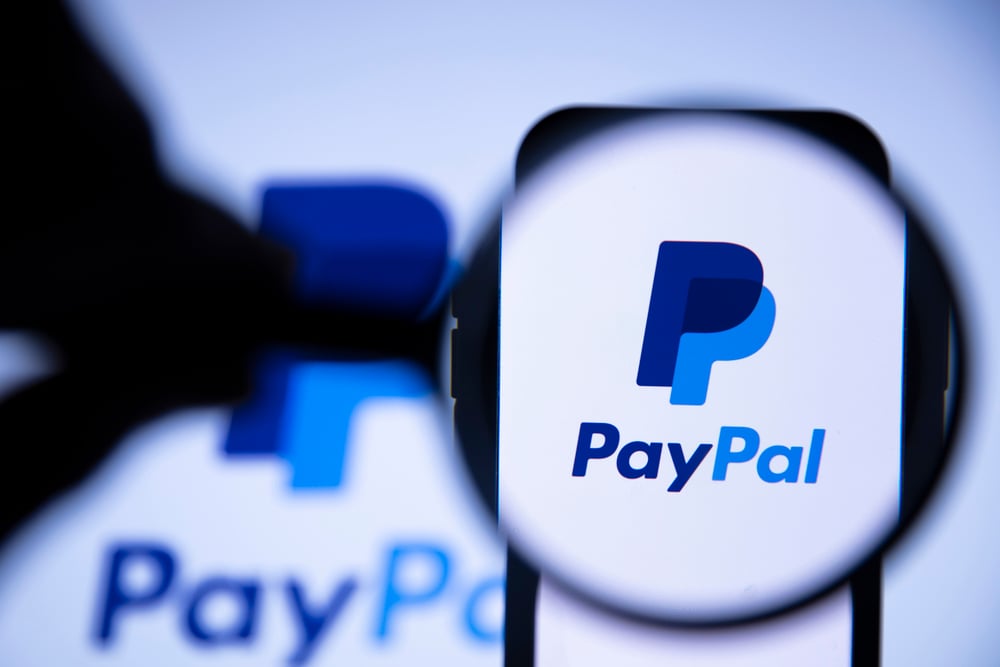Paypal Shows Promise With Strong Buy Rating Analysts believe Paypal could be a Strong Buy as earnings are not only steady but growing, even amid tough competition; thanks to resilient sales.
By Keala Miles
This story originally appeared on MarketBeat

While the company started the year off with a big earnings drop from Q4 2021, Paypal Holdings Inc (NASDAQ: PYPL), has already begun to claw its way back. And even with the rocky start they had, the digital payment systems provider is on track to continue an impressive earnings climb over the past four consecutive years.
The stock has a current EPS of $0.96 on $6.8B in sales and analysts have rated the stock a Moderate-to-Strong buy. The current price target is $132.21 with a range of $90.00 to $270.00.
Strong Sales Lead to Resilient Earnings
Paypal has enjoyed a steady rise to its June 1, 2021 historical high of $291.48. Unfortunately, this plateau was quick as the stock has been on a pretty steep fall since then. Fortunately, the stock bounced back, a little, at a recent low of $69.84 exactly one year later (June 1, 2022).
It is also fortunate, that both earnings and sales have been steady and stable. Over the last four quarters, for example, reported earnings beat the estimate 50% of the time and only barely missed the estimate once (Q4 2021). No matter the hardship, though, earnings always registered within the estimated range. Quarterly sales met the estimate 3 out of 4 quarters, beating the Q1 2022 estimate by a comparably slim margin.
On an annual basis, earnings beat the consensus estimate 3 out of the last 4 years, often at the very top of the range. Then last year, 2021, reported earnings satisfied the estimate, suggesting that while share price plunged, sales have always been good. Indeed, annual sales beat estimates the last two years; and the two prior met the target.
Paypal Outperforms in A Tight Industry
The bad news is that Paypal share value is down -$0.58 on the last year, sitting in the bottom 10% of the stock's 52-week range. The good news, though, is that Paypal's competitors are not faring much better. Intuit Inc (NASDAQ:INTU) is another financial management company, but you may know them better as the owner/operator of QuickBooks and Credit Karma. They have also received a [Moderate] Buy, are also down about -$0.40 on the year, and are only within the bottom 15% of its 52-week range.
Paypal has a higher upside than Intuit (59.80% vs 35.20%) as well as greater projected earnings growth (28.37% vs 16.43%). That said, Intuit has a higher P/E ratio (54.82) than Paypal (47.37) and a Return on Assets (RoA) more than double that of Paypal (9.93%). Both report similar Return on Equity (RoE)—around 16.6%—but Paypal's Price-Sales Ratio (P/S) is a third that of Intuit (8.92). Finally, Intuit's 1.19 beta means it is only about 19% more volatile than the S&P 500, which is half as volatile as Paypal.
SAP SE (NYSE: SAP) is a business software company that designs and implements various programs, some of which include financial management. Analysts have given SAP a HOLD rating, as the company has demonstrated lower RoE and RoA than the other two (7.82% and 4.49%, respectively) and its upside is only 10%. With a comparable P/E ratio and net margin, it is only 6% more volatile than the S&P and a projected earnings growth near 29%.
Venmo Could Be Paypal's Secret Weapon
Paypal also owns the social payments app Venmo, which is one of the most popular such apps available today. Venmo has made waves, recently, threatening to pull out of their Phoenix Suns sponsorship in light of recent controversy with the NBA team's owner, Robert Sarver. This type of notoriety could bring in more users.
In addition to this, Amazon just announced it will allow customers to checkout using Venmo. This is a major development since Amazon does not accept Paypal.
On the other hand, Venmo—and, thus, its parent Paypal—may also benefit from the recent Zelle scandal. Zelle, which is actually owned by a handful of banks that wanted a more accessible kind of bank transfer system, is a Venmo competitor. Unfortunately for Zelle, unlike Venmo (and Paypal) their platform is actually quite prone to fraud.
This is particularly concerning because Zelle has grown very quickly—since its 2017 launch—to become the largest P2P payment system in the United States. With transactions totaling $490B last year (up nearly 60% YOY) it did more than double Venmo's business ($230B).
As a matter of fact, Zelle users lost an estimated $440M last year, to fraud and scams; and banks, so far, have not repayed 90% of these cases. So while the big banks that formed and own Zelle rake in superior profits, they do not seem to be interested in user security. This could be pivotal for Paypal over the next year.










